GK David Seaman
Wenger inherited a keeper who was experienced, a proven winner, at peak age for his position, and as a bonus he had a phlegmatic personality that allowed him to greet most things with his low bass laugh. In his first match in goal for his junior school he conceded 14 goals in 45 minutes and never looked back. Such was the esteem he was held in, Wenger did not have to lose much sleep over the goalkeeping position with Seaman as his established No1 for seven seasons. Some deputies came and went - Vince Bartram, Alex Manninger, Richard Wright and Stuart Taylor shared that limited opportunity with a variety of results – until Jens Lehmann arrived as Seaman's replacement. Seaman won two doubles under Wenger and was inspired as he bowed out with another FA Cup win in 2003, lifting the trophy as captain on the day. "An outstanding professional," said Wenger of Seaman.
RB Lee Dixon
If you look closely at a clip of Freddie Ljungberg's beautifully curled goal in the 2002 FA Cup final, a tracksuited figure behind the goal wheels off in manic celebration. He had possibly not run that fast in some time.
Dixon had been warming up and reacted with a youthful verve that belied his 38 years. That is an impressive age for an outfield player to be still performing at the highest level. The intelligence and humour now seen in Dixon's punditry contributed a lot to his team on and off the field. He straddled two successful Arsenal eras – he was 25 when he was part of the team that won the league at Anfield in 1989 and he went on to collect multiple trophies under George Graham. He was 34 at the time of Wenger's first success. The famous Arsenal back four formed the foundation for both these managers and, when Wenger arrived in 1996, one of the crucial things he recognised was the need to leave the defence well alone. Wenger was amazed at how the chain of Dixon-Adams-Bould-Keown-Winterburn continued to produce top quality performances for so long.
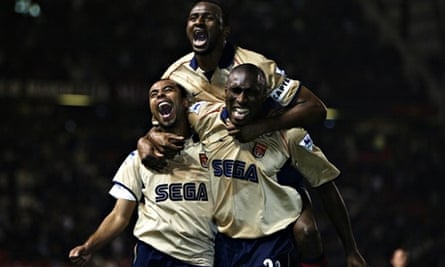
CB Tony Adams
One month before Wenger joined Arsenal, Adams made a public admission about his fight against alcoholism. A player who had willingly shouldered as much responsibility as he could possibly carry in his inspirational captain guise began to re-invent himself, and it was a happy coincidence that the manager who walked in the door was infinitely more open-minded and progressive than was the norm in English football at that time. Adams had his suspicions, but found the perfect manager for his situation. Wenger's thoughtfulness, allied to the fact he wanted to create a more professional environment, created an atmosphere which made it easier for Adams to change his life. He remained a vital figure, a strong personality, and a dependable player. His game was even liberated under Wenger (as exemplified by a perfectly timed move upfield to score a memorable goal in the game that won the 1998 title). He is the only English player to have captained his team to the league title in three different decades.
CB Sol Campbell
Word had got around the smattering of media representatives who showed up at London Colney in pre-season in July 2001 that Arsenal were going to unveil their new signing, the goalkeeper Richard Wright from Ipswich. When Sol Campbell strolled in the shock of this particular masterstroke was intense. In signing the captain of Tottenham, Wenger oversaw a move that many never imagined possible. Having come to the end of his contract Campbell was a free transfer, and he became a priceless asset for Arsenal as he took the baton from Adams to become a towering force in defence with a strong sense for organising his team-mates. Campbell won the double in his first season in 2001-02, and went on to have a vital role in the Invincible season of 2004. One of the main reasons Campbell took the decision to make such a controversial move was his desire to work, and improve, under Wenger.
LB Ashley Cole
The theory was that Wenger did not rate English youngsters. It didn't matter how often he claimed that the ratio between overseas imports and local talent had nothing to do with passports, and more to do with English players being overpriced. All the same, it needed a lucky break for Cole to get a footing in the first team. There were concerns about the passport being used by Sylvinho, the Brazilian, and in 2000 the path for Cole to play suddenly opened up. A homegrown player and former Junior Gunner, Cole seized the opportunity. His combination of speed, alertness, technique and a gritty will to win made him a brilliant example of how a young English player could develop superbly under Wenger's tutelage. As Arsenal's defence was remoulded, Cole and Lauren showed how the manager liked his modern full-backs to break with pace and become auxiliary wingers whenever possible. Although he has not been forgiven by the faithful for moving to Chelsea in 2006, he remains the best of a very strong bunch of left backs Wenger has worked with at Arsenal.
RM Robert Pires
The famous story of Pires's debut is instructive for what it tells us about both the player and his manager. Arsenal were playing away at Sunderland. "I've left you on the bench," Wenger told Pires. "I want you to watch how the game goes. I need you to understand how matches are played over here." Needless to say, Pires was aghast by the brute force on show (it ended in a 1-0 defeat with Patrick Vieira sent off in the middle of the general hostility). Pires was allowed to adapt at his own pace, and once he had strengthened up, he was ready to shine. The rapport on the pitch between Pires, Thierry Henry, Vieira, Dennis Bergkamp and Freddie Ljungberg was exceptional. His creativity was matched by a fantastic knack for goals from wide midfield. Pires was voted as the PFA Player of the Year in 2002.
CM Patrick Vieira
This beanpole from Milan was effectively how "Arsène Who?" was introduced to the Arsenal supporters. An insight into the transformation of the club's identity which was around the corner – with the old boring tag replaced by something unexpectedly dazzling – arrived when Vieira cruised onto the Highbury pitch after half an hour of a game Arsenal were losing 1-0 to Sheffield Wednesday in September 1996. The game took place two weeks before Wenger started his managerial reign. Vieira had obviously been signed on his say-so, and was immediately outstanding. After the midfield hustling they were used to at Highbury, it was startling to see a player in that position so comfortable on the ball. Vieira became a classic Wenger success story. A relatively unknown name, who was struggling for game time as a young player at Milan, before long he was a world-class performer coveted by every major European club. His all-action style, telescopic tackling, graceful attacking, and leadership by example was essential to Arsenal's success between 1998-2005. At his pomp, his manager felt he was the best in the world in his position. "If you find a better one, bring him to me," Wenger quipped.
CM Cesc Fábregas
Wenger has always been brave enough to pitch young players into the action, and with Cesc Fábregas, he had unerring confidence that he had found a gem which was finely polished from the moment he arrived in London aged 16. Fábregas broke records, becoming Arsenal's youngest ever player and goalscorer. Barcelona had originally been upset when Arsenal attracted him away from their academy, but coming to London meant he enjoyed accelerated progress, playing regularly in the first team once he hit 17, which was unlikely to have happened at the Camp Nou. In many ways Wenger built his post-Vieira team around Fábregas's refined passing game. He was the poster boy for the model Wenger hoped would sustain Arsenal as they operated with restricted finances during the move from Highbury to the Emirates: recruit the best kids, integrate them while they are cheap enough to buy and young enough to feel a certain pride at being educated together. It never quite came to fruition and key players left before peaking as an ensemble. There may not have been a happy ending at Arsenal, but Fábregas remains one of the greatest talents from the Wenger years.
LM Marc Overmars
The photographs from a summer's day at Highbury, with Wenger in his beige suit flanked by Emmanuel Petit and Marc Overmars, mark the moment Wenger finalised the jigsaw for his first title-winning team in England. Petit came from Monaco and would be transformed from a left-back into a powerful midfield partner for Vieira. Together they formed an imposing combination, able to both protect the defence and be an inventive springboard for the attack. As for Overmars, in came a flying winger whose directness and pace made him a brilliant creator and finisher. His combinations with his fellow Dutchman Dennis Bergkamp were masterful. His knack for scoring important goals in the run-in to the 1998 double was crucial. Overmars spent only three years with Arsenal, but he was a sensation. With fellow speedster Nicolas Anelka, he epitomised how Wenger's football is at its best when based on devastatingly fast breaks.
CF Dennis Bergkamp
Bergkamp joined old Arsenal. He was happy to come to a club that was still hooked on old fashioned practices. But if ever a player were tailor-made to be in situ, ready to guide the club along the change to new Arsenal, it was him. Bergkamp and Wenger were kindred spirits in some ways. When it comes to football they are both perfectionists, analysts, and believers in the purest technique possible. "Until the last session of his training he was absolutely never neglecting a control, or a pass," Wenger remembered in Bergkamp's book, Stillness and Speed. The Dutchman led by example, and the manager had enough respect for him to indulge the fact he would not fly to long distance Champions League missions. His playmaking and intelligence made him a superb foil for all his fellow attackers (Ian Wright, Anelka, Henry, Ljungberg, Pires …) and Bergkamp was the link in all Wenger's title winning sides – 1998, 2002 and 2004.
CF Thierry Henry
In any conversation about the Premier League's best performers, Henry ranks highly. At his peak, he rampaged across the division with a fusion of grace, imagination, and that catchphrase va-va-voom. He was the division's top scorer for four consecutive seasons, and Footballer of the Year three times. In re-moulding Henry from a winger to a central force and plunderer of exceptional goals (even though he still liked to roam out to the left) Wenger showed not just the player's great qualities, but also his own. Convincing someone to take up a new position takes vision, patience and skilled teaching. Admittedly he had the perfect pupil in Henry, who was desperate to make his mark on the club. The player himself said he had to be "re-taught everything about the art of striking." By the time he had done that, he was teaching English football a thing or two.
Substitutes: Wojciech Szczesny, Lauren, Martin Keown, Gilberto Silva, Fredrik Ljungberg, Ian Wright, Nicolas Anelka.
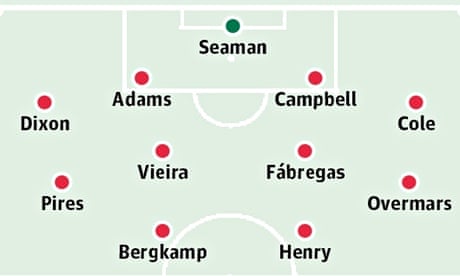

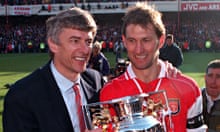
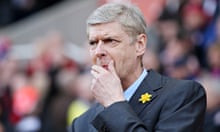
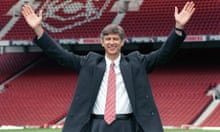
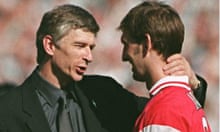
Comments (…)
Sign in or create your Guardian account to join the discussion